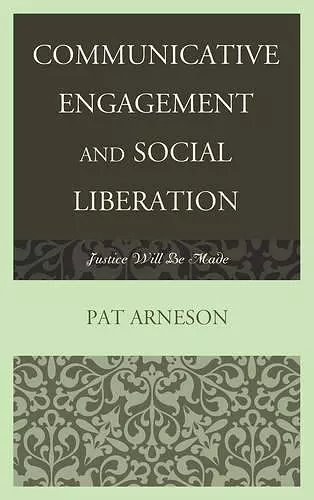Communicative Engagement and Social Liberation
Justice Will Be Made
Format:Hardback
Publisher:Fairleigh Dickinson University Press
Published:29th Nov '13
Currently unavailable, and unfortunately no date known when it will be back
This hardback is available in another edition too:
- Paperback£44.00(9781611478532)

Communicative Engagement and Social Liberation: Justice Will Be Made recognizes limitations in contemporary understandings that separate history and rhetoric. Drawing together ontological and epistemic perspectives to allow for a fuller appreciation of communication in shaping lived-experience, facets of the two academic subjects are united in acts of communicative engagement. Communicative engagement draws from Anna-Teresa Tymieniecka’s writings on the human condition; extends the communicative praxis of philosopher Calvin O. Schrag by reuniting theōria-poíēsis-praxis; expands Ramsey Eric Ramsey’s writings to provide ground for vitalizing social liberation; and includes the work of philosophers including Hans-Georg Gadamer, Maurice Merleau-Ponty, and Michel Foucault as well as philosophers of communication including Lenore Langsdorf, Michael J. Hyde, Corey Anton, and others who guide a recollection of the significance of poíēsis in human communication. Myrtilla Miner, Mary White Ovington, and Jessie Daniel Ames dedicated their lives to being out-of-place and speaking out-of-turn to alter the way humanity was understood by members of society at large. The lived-experiences of these historical figures assists readers in recognizing how creativity (poíēsis) can potentially enable liberation from restrictive social circumstances.
Professor Arneson is gifted with an exceptionally keen analytic eye and a creative mind. These talents are obvious as she eloquently integrates teachings in philosophy, communication ethics, and rhetorical theory to explore with the help of marvelous case studies the social injustice of racism. -- Michael J. Hyde, university distinguished professor of communication ethics, Wake Forest University
There is always more to be said and sometimes it gets said by saying things otherwise. We mistakenly think we know enough until someone such as Dr. Arneson puts it otherwise from a fresh perspective. By making use of a thoughtful philosophy of communication, things as yet hidden from our thinking about liberation, ethics, and the history of American feminism are here brought to light. This is no small feat as it requires erudition in both philosophy and rhetorical/historical study to say such things. We have here in Dr. Arneson’s courageous work a significant contribution to our thinking in all these many ways. -- Ramsey Eric Ramsey, associate dean, Barrett The Honors College, Arizona State University and co-editor of the Philosophy/Communication book series
“Pat Arneson's telling of how teacher Myrtilla Miner, social worker Mary White Ovington, and political activist Jessie Daniel Ames worked against economic, legal, and social injustice portrays a rhetorical history beginning in the United States during the mid-1980s. By placing our current communicative engagement into juxtaposition with that of Miner, Ovington, and Ames, Arneson reveals the tensions between imaginative creativity that actualizes possibilities for changing sociopolitical norms, and entrenched ways of thinking that suppress democracy's potential for sociopolitical liberation.” -- Lenore Langsdorf, emerita professor, Southern Illinois University at Carbondale
In her carefully crafted book Professor Arneson furrows new conceptual territory on the entwinement of communication, social liberation, and the quest for justice in civil society. The philosophical backdrop of her stimulating discussion is a retrieval and reinterpretation of the processes at work on the interconnected landscapes of the ancient Greek triad of theoria/praxis/poiesis. That which makes her work especially important for interdisciplinary research in philosophy and communication studies is her demonstration of how the philosophical issues at stake in her project are exhibited in the case studies of three American women who devoted their lives to the advancement of liberation from a variety of social injustices. She deftly supplements her philosophical analysis and argumentation with dialogues and encounters that arise within the economies of everyday lived experiences. -- Calvin O. Schrag, George Ade Distinguished Professor of Philosophy Emeritus, Purdue University
In this important book, Pat Arneson reminds us that some citizens have always imagined a fuller, fairer America and have had the courage to work to realize that vision. Arneson’s careful research and compelling storytelling bring to life the (his)stories of three remarkable women whose work for racial justice in America has heretofore been too little noticed. Arneson provides compelling accounts of Myrtilla Miner, Mary White Ovington, and Jessie Daniel Ames, three courageous white women who dared to step out of their assigned place in order to fight against racial injustices that prevailed in America. Arneson persuasively shows that the issues of racial injustice that these three women resisted are not confined to history, but persist in our era as we continue to struggle to create a more perfect union. Arneson offers communicative engagement as a transformative means by which individuals can move themselves and others out of injustices that mark a particular time and place. -- Julia T. Wood, Lineberger Distinguished Professor of Humanities Emerita, The University of North Carolina at Chapel Hill
ISBN: 9781611476507
Dimensions: 235mm x 160mm x 22mm
Weight: 467g
232 pages